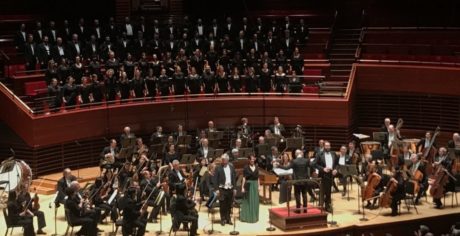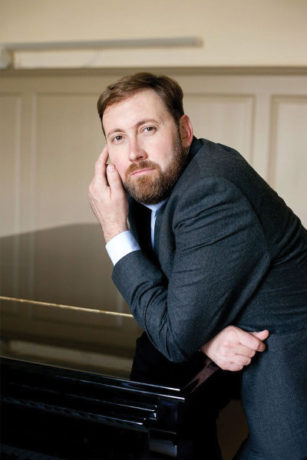The programming of music by Haydn is unusual for The Philadelphia Orchestra. The choice is even more surprising coming from conductor Yannick Nézet-Séguin, who is more associated with modern compositions by composers like Mahler, Bruckner and Stravinsky.

Yet Nézet-Séguin chose Haydn’s The Seasons to fill the entire program in his concerts of November 16, 17 and 18, making it the first major presentation this season that combined orchestra, chorus and soloists. This is the first performance of the complete Seasons in the history of the Philadelphia Orchestra.
The most famous conductors in Philadelphia — Stokowski, Ormandy, Muti — tilted towards the passionate sounds of romantic composers, rather than classicists like Haydn. I’ve always had a soft spot in my heart for Haydn. His music was the first that was placed in front of me by my earliest piano teacher, Madame Gusikoff.
The form which he originated lent its name to the entire world of orchestral performance which everyone now calls “classical music.” Born in 1732, he composed 102 symphonies, plus string quartets in similar style, with a design that lays out a melody, repeats it, then introduces a second melody before returning to another repetition of the first. His symphonies all are in four movements which alternate fast, slow, dance-like, and fast again. Everything is perfectly proportioned. This may seem arbitrary, but his formula gives listeners a sense of stability and reassurance. In the turbulent times we live in, it’s tremendously appealing.
As Haydn aged, he became ever more creative with melodies. Therefore his later symphonies are his best, even though he stuck to his old patterns. While some composers (like Beethoven, Verdi, Wagner) radically changed their styles and invented new forms, Haydn remained faithful to what made him famous, although did add more brass in his later compositions. The fact that he kept coming up with good tunes is no small feat. Aaron Copland, when he was in his 70s, told me he stopped composing because “when you’re old, it’s hard to think of anything new.”
The Seasons is one of Haydn’s last compositions, from 1801, and shows his mastery of orchestral and vocal writing. Nézet-Séguin’s conducting revealed the transparency of the music. Swiss soprano Regula Mühlemann, German tenor Werner Güra and American bass Matthew Rose used subtle shadings as they sang the words of a village lass, a lonely traveler and a rustic plowman.

The piece begins in the dark gloom of winter before it makes way for joyous spring. Each season is introduced by moody orchestral tone-paintings. Haydn’s instrumentation depicts, among many other things, the sound of hopping lambs, fluttering birds and hunting hounds.
Haydn’s choruses are uplifting, with catchy counterpoint. The Philadelphia Symphonic Choir painted a tapestry of sunrises and sunsets, hunts, harvests and changing times of year. A thundering storm resembles what Beethoven (a pupil of Haydn) would write later in his Pastoral Symphony. Oboe solos by Richard Woodhams and flute solos by Jeffrey Khaner were especially lovely.
After The Seasons, ill health prevented Haydn from writing much more. He was unhappy in his forced retirement and in 1806, at age 74, said “Musical ideas are pursuing me, to the point of torture. I cannot escape them, they stand like walls before me. If it’s an allegro that pursues me, my pulse keeps beating faster, I can get no sleep. If it’s an adagio, then I notice my pulse beating slowly. My imagination plays on me as if I were a clavier.”
At least he left behind this colorful summation of his career. And at long last the Philadelphia Orchestra has revealed it to the public. The concert will be broadcast on WRTI in January (exact date to be announced).
Running Time: 2 hours and 30 minutes, with one intermission.
Haydn’s The Seasons performed by The Philadelphia Orchestra was presented November 16 – 18 at Verizon Hall at the Kimmel Center for the Performing Arts – 300 South Broad Street, in Philadelphia, PA. For tickets to future concerts and shows, call the box office at (215) 893-1999, or purchase them online.




